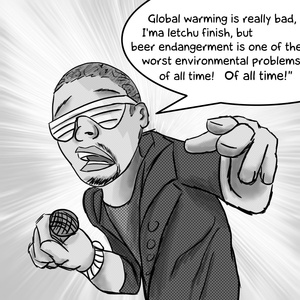Climate change threatens drinkability
People who discredit or just don’t care about global warming are like drunk gamblers in a casino who bet away the deeds to their homes: They are taking a massive risk that will almost certainly result in homelessness, and they are likely to be wearing teal, polyester stretch pants.
Global warming, if nothing else, is the one cause that the entire world should be able to unite under. Cultural, geographic and religious differences aside, as a race, humans have one thing that we all share — and that thing is Earth.
There is a case to be made that we are not, in fact, all on the same planet. Surely, the cast of The View is visiting from a space station for the insane. And it’s hard to believe that the musical artist Lady GaGa exists in the same solar system, let alone the same celestial body, as the rest of humanity.
Still, we’re all stuck here together and global warming is claiming victims all over the place, each more adorable than the last. Snowy owls, polar bears and emperor penguins are all reported to be at risk because of the effects of global warming on arctic and antarctic ecosystems, and this is to say nothing of the extreme weather, rising sea levels and melting permafrosts that are already wreaking havoc on our world.
But if furry baby animals and the threat of catastrophic natural disasters can’t unite us, can anything?
There is hope. Just last Sunday, our nation came together, and through various means of viral communication, declared that Kanye West was a dick. Even President Barack Obama added his voice to the crowd.
But, already, the nation’s sympathy for Taylor Swift has dissipated: Most of us have remembered that we don’t like country music anyway, and we have reminded ourselves that the Video Music Awards lost their relevance years ago.
Luckily, there is one more thing with the potential to unite us all — not just as a nation, but as a species. And that thing is beer.
According to a climatologist at the Czech Hydrometeorological Institute, the quality of hops used to make pilsner lager has been decreasing in the last few years because of increased air temperature, courtesy of global warming.
The problem is because the acidity of the hops — which gives pilsner its slightly bitter taste — has been declining by 0.06 percent per year since 1954.
The beer endangerment in all likelihood will only be a minor problem at first, since the hops measured in the study were grown only in Eastern Europe.
What this means is that for a few years, only imported brews and pretentious drafts will be affected, and there will still be cause for global warming deniers to argue that climate change, like arugula and free trade coffee, is just an affectation of the elitist upper class.
But, there’s no saying that similar climate problems won’t soon affect the rest of the beer industry. Beers across the world could gradually become weaker and weaker until even Guinness tastes like Bud Light.
Imagine, we could one day look back on our college days and think wistfully of the Natural Light we consumed so thoughtlessly, not taking care to savor the flavor that will have since left all beers. God forbid.
The first stop to putting an end to this will be to have the president make an off-the-record comment about global warming and beer. And united we will stand.
Laura Reeve is a senior majoring in public relations. Her column, “Folk Laur,” runs every other Wednesday.

